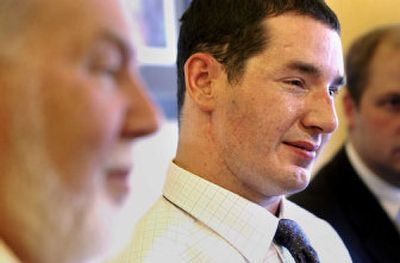Kralicek pushes for officer disability fund

Mike Kralicek, the Coeur d’Alene police officer shot in the face in 2004, is strong enough to take on a new battle other than recovery. He’s fighting to ensure that Idaho takes care of law enforcement officers, like himself, who are permanently disabled in the line of duty.
Kralicek called a press conference Friday to push a bill to create a catastrophic disability fund. The officer gained notoriety when he was shot three days after Christmas while chasing a fleeing, handcuffed man suspected of stealing beer kegs. At the time, no one was sure whether he would survive, let alone talk and walk again.
“If you don’t recognize me, I’m Mike Kralicek,” he told about 15 local law enforcement officers gathered with media in the back room of Michael D’s Eatery in Coeur d’Alene.
The measure would create a fund to pay lifetime health insurance costs for disabled officers and their families. It’s estimated that just two officers in the state would qualify for the coverage, which would apply only to officers with permanent disabilities.
Kralicek’s health insurance coverage was cut off a year after the shooting. Now he pays $1,200 a month to insure his wife and two children. The cost puts a financial strain on the couple, especially since Carrie Kralicek quit her job as an emergency room nurse to care for Mike.
“One of the hardest things is we lost two incomes,” he said.
The only income the couple has is about 91 percent of his former salary that’s paid by worker’s compensation and Social Security.
That’s how the catastrophic fund would help.
The Coeur d’Alene Police Department provided Kralicek health insurance for the first 12 months after the shooting. But the department’s policy only covers rehabilitating officers for one year. If unable to return to work by then, the officer is taken off the payroll and loses health care coverage.
Sen. Mike Jorgenson, R-Hayden Lake, plans to introduce the bill if he’s re-elected. He admits that there are many details to work out, including how to pay for the fund.
One idea is to increase the amount of court fines paid by people convicted of misdemeanors and felonies. Jorgenson said it’s possible the state may have to contribute money.
Kralicek is strong and can walk on his own, although his gait is slow. He no longer goes to physical therapy but said he works out at home.
“We get out and walk a lot,” he said.
From coma and paralysis, three hospitals, and month after month of painful therapies, Kralicek said, he is ready to take over the fight that his wife started.
Carrie Kralicek didn’t attend the event, opting to stay home and watch her husband on TV with their 12-year-old daughter.
“He’s independent enough to stand on his own two feet,” she said Thursday. “I’m so proud of him being able to do it. I’m getting choked up. But it’s a good choked up.”